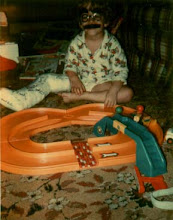If you're a fan of George Carlin at all, you'll realize over time reading my posts (or, you would have realized if I wasn't right now in the act of telling you - now you'll already know at the time that you otherwise have realized it) that the fun I have playing with the intricacies and oddities of our language, our use of language, is very much inspired by George.
Such as --- Why is it that you never hear anything referred to as "new hat," except for... a new hat? I mean, how come you'll hear someone say something like, "Oh yeah, I've done this plenty of times before. This'll be old hat," but you never hear something like, "Nope, never done that before. It's going to be new hat for me?"
There's a whole slew of words and phrases which we only use when we negate them. The original positives exist, I suppose, but you never hear them in conversation. At one job, I had a Post-It* note on the side of my computer monitor that read, "When gruntled, I only speak in chalant sequiturs." This stemmed from a conversation in which I made this very point, and used disgruntled, non-chalant and non-sequitur as my examples. If we have disgruntlement, non-chalance and non-sequiturs, does it not follow that there must be gruntlement, chalance and sequiturs? (Actually, I suppose it would have to precede that we have those, not follow.) Where are they, in our every day parlance?
And why is it that one thing will be old-fashioned, but its opposite is new-fangled. Why isn't it new-fashioned? There's no old-fangled. There's not even fangled, as far as I can tell. What is fangled, anyway? Sounds like there's something wrong with it. "Damn thing's all fangled." "I know. And it's still new!" For my money, if it's new and it's already fangled, we probably should have stuck with the old-fashioned kind.
To quote Mr. Carlin directly, "These are the kind of thoughts that kept me out of the really good schools."
*Invented in Minnesota
Wednesday, May 21, 2008
Subscribe to:
Post Comments (Atom)


No comments:
Post a Comment